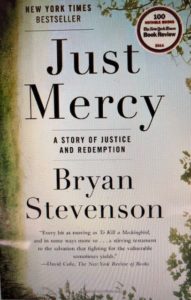I grew up trusting the police, the courts and the justice system. In elementary and high school civics classes, I learned a lot about the American system of justice, the importance of telling the truth and that everyone is innocent until proven guilty.
I loved watching court dramas on TV. Some of my favorites were Dragnet, Judd for the Defense and Perry Mason. I believed the police always told the truth, the lawyers did their best for their clients and the innocent always went free.
Fast forward to today. I just finished reading Just Mercy by Bryan Stevenson* which was published in 2014. Bryan wrote about his experiences defending death penalty cases in Alabama from the 1980s until now. The stories he tells are heartbreaking.
For the most part, his clients are sitting on Death Row because they are poor, African-American and have had bad to abysmal representation in court. If they weren’t so poor, they could have afforded a lawyer who would have attempted to represent them, if for no other reason than to keep getting paid. And, if they weren’t African-American, having an all-white jury in Alabama might have been a plus.
In Just Mercy, the author doesn’t just talk about legal motions so much as tell stories. And the stories are heart breaking. There’s Walter McMillian, who was on death row for six years after being convicted of murdering eighteen-year-old Ronda Morrison, a clerk, working in a dry cleaners. It didn’t matter that he had numerous witnesses, one of whom was a police officer, to the fact he had been attending a church fish-fry many miles away at the exact same time. In Walter’s case, Sheriff Tom Tate and other law enforcement officials and witnesses were so determined to convict him that they committed perjury and fabricated evidence.
At one point, when Walter protested his innocence, Sherriff Tate replied, “I don’t give a damn what you say or what you do. I don’t give a damn what your people say either. I’m going to put twelve people on a jury who are going to find your goddamn black ass guilty.”**
Then there’s the story of Michael Lindsey. In the spring of 1989, several other of Mr. Stevenson’s Death Row clients asked him to help Michael. He was scheduled for execution in May. After that execution, they asked that he help Horace Dunkins, who, even though he was mentally retarded, was scheduled to be executed in July and then Herbert Richardson, who had gotten P.T.S.D. in Vietnam, and who was scheduled for August. Everything was happening so fast—so many executions and not enough time for good defenses.
There are also a number of stories of people who were exonerated and freed from prison after tremendous amounts of work. This would have never happened without both the resources Mr. Stevenson was able to bring to bear, such as first-class criminal investigations, and his own brilliance in presenting the evidence so convincingly that courts could only decide in favor of his clients.
If you’re interested in how our justice system really works and like sitting on the edge of your seat until you find out the verdict, this is the book for you!
* Just Mercy by Bryan Stevenson, 2014, Spiegel & Grau, New York.
**Wikipedia: McCarthy, Colman (October 10, 1995). “A Matter of Death and Life”. Review of Circumstantial Evidence: Death, Life, and Justice in a Southern Town by Pete Earley Bantam. Retrieved December 14, 2017.


4 comments
Skip to comment form
Have mercy! Claire, I enjoyed reading your blog about “Just Mercy.” How do we learn to again trust the police when too many police officers and the court system cause such mistrust especially in the African American community? When will it change? How do we facilitate that change? I wish I had the answers.
Thank you for commenting. I appreciate it. I was beginning to think I was writing only for myself. I agree with everything you’re saying!
Thanks for making a comment!
I enjoyed to read it.